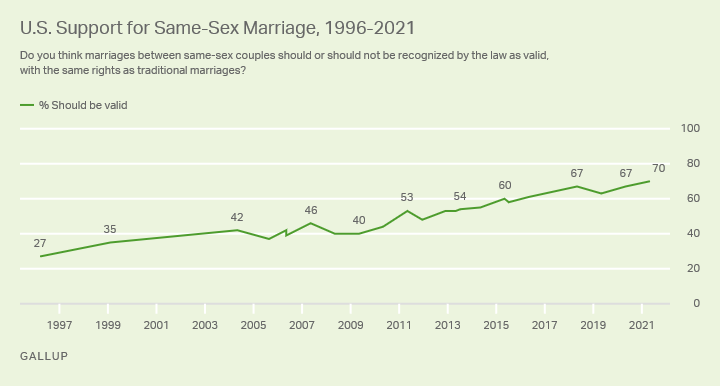Volcanoes are erupting in The Philippines, but on-fire Australia received some welcome rain. The Iran war cries have been called off and The Donald’s military powers are about to be hamstrung by the Senate. Meanwhile, his impeachment trial is starting, and we’re all on Twitter for a front-row seat.
Progress in Five Minutes: Human Rights for LGBTQ People Around the World
The swift advancement of acceptance for the LGBTQ community over the last two decades has been incredible.
Updated December 8, 2021
“Marriage is about a historic, religious, and moral content that goes back to the beginning of time, and I think a marriage . . . has always been between a man and a woman.”
“I believe that marriage is the union between a man and a woman. Now, for me as a Christian . . . it is also a sacred union. God’s in the mix.”
Jeez. Who are these people spouting these backwards sentiments? Oh, just Hillary Clinton and Barack Obama, respectively, in 2000 and 2008, when the future Secretary of State and President supported civil unions in the LGBTQ community but stopped short of full marriage.
The swift advancement of acceptance for the LGBTQ community over the last two decades has been incredible. When Obama was sworn in as president in 2009, just two states recognized gay marriage (Obama began embracing same-sex marriage in 2012, Clinton the following year). By 2015, 37 states and DC had legalized unions. That was also the year the US Supreme Court struck down state bans on same-sex marriage.
Polls in 2013 indicated support for gay marriage split down the middle; in 2019, according to the Pew Research Center, about 61 percent of Americans supported same-sex marriage. Now, in a Gallup poll released last week, 70 percent of Americans support same-sex marriage—the highest percentage to date, and the first time more than half of Republicans supported it.

Marriage equality is just one aspect of assuring everyone has the right to live a happy and healthy life. In honor of Pride Month, which commemorates the 1969 Stonewall Riot in New York City that launched the gay rights movement, The Progress Network (TPN) takes a look at the status of LGBTQ rights around the world and other adjacent issues, like ending AIDS in the not-too-distant future and securing rights for transgender people.
Same-sex Marriage Worldwide
There are 31 countries around the world where same sex marriage is legal. In 2019, Taiwan became the first country in Asia to legalize same-sex marriage. Earlier this year, a Japanese court ruled that the country’s ban on same-sex marriage was unconstitutional, which is likely a big step toward legalizing gay marriage in the only G7 country that still bans it. And in December, Chile voted overwhelmingly to allow same-sex unions. According to Human Rights Campaign, there is momentum to support same-sex marriage in Czech Republic, the Philippines, and Thailand. And kudos to these countries that have over the last two years started recognizing same-sex marriage: Austria, Ecuador, Costa Rica, and Switzerland (we admit we were very surprised by this last one, although civil unions were allowed previously).
Around 20 additional countries recognize civil unions, granting rights to LGBTQ couples but stopping short of endorsing “traditional” marriage.
Unfortunately, 69 countries around the world still have laws that deem homosexual sex acts illegal. According to a recent BBC analysis, half of these countries are in Africa, where many of the laws remain from the colonial period (36 out of the 53 British Commonwealth countries still have these laws on the books). It is worth noting progress in this literally life-and-death matter: last July, Sudan repealed the death penalty for consensual sex acts between LGBTQ people.
Ending the AIDS Epidemic
HIV affects everyone, but has historically been harshest on gay men, transgender people, sex workers, drug users, and other vulnerable populations. (New HIV infections in Sub-Saharan Africa, however, are highest among girls and young women.)
Earlier this month, UNAIDS, the UN-backed public health program dedicated to stopping the spread of HIV/AIDS, said that because a number of countries had surpassed 2020 targets set by the UN in 2016, the world is on track to end AIDS by 2030. The report notes, however, that there is still more work to be done, particularly in countries that are less progressive and inclusive with regard to LGBTQ relationships and access to healthcare. The report also found that the number of people around the world living with HIV and successfully on treatment has tripled since 2010, from 7.8 million to 27.4 million of the 37.6 million people living with HIV. UNAIDS attributes “the roll-out of affordable, quality treatment” to stopping 16.2 million deaths since 2001. There was also a 43% drop in AIDS-related deaths since 2010, as well as a 30 percent drop in new infections.
Transgender Visibility and Legislation
There are currently eight US legislators who openly identify as transgender—a figure that doubled with the 2020 election. This year, unfortunately, we’ve also seen more anti-transgender legislation introduced than ever before. These bills seek to prohibit transgender children from playing sports and accessing proper medical care. Earlier this month, Florida became the eighth state to mandate that public school and college students play sports as their biological gender; Human Rights Campaign announced the same day they intended to sue the state government to reverse the legislation. Though President Joe Biden has publicly supported the rights of transgender people, advocates say more concrete action is needed, and we at TPN couldn’t agree more. And, we hope to see more legislation that proactively protects the rights of LGBTQ people, as in California, which in 2020 mandated that transgender people in prison can be housed according to their gender identity.
To sum it all up: we’re amazed and heartened at the rapid social and legal shift toward recognizing same-sex marriage, both in the United States and around the world. The recent Gallup poll, especially, shows that LGBTQ rights have broken free of being a partisan issue, despite the fast introductions of anti-transgender legislation by Republican lawmakers. This acceptance may very well pave the way toward more concrete protections for everyone.




My research revealed gay marriage ruling in Massachusetts in 2004, quickly followed by California/San Francisco. On what parameters are your data based?